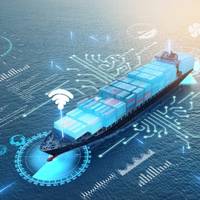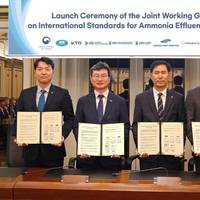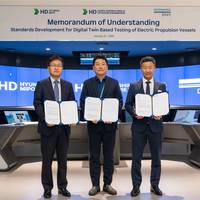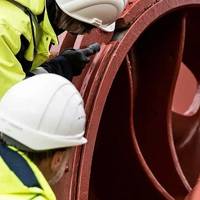DNV Updates Simulator Standard for Evolving Maritime Training

DNV has released a revision of its Maritime Simulator Systems Standard (DNV-ST-0033), reflecting the growing diversity of simulation technologies used in maritime training and certification.The updated standard introduces terminology for virtual reality (VR), synthetic environments and mixed reality, reflecting the growing diversity of simulation formats.The foundational competence requirements have been extended to include alternative fuels such as ammonia, hydrogen, ethanol…
New Partnership for Standards on Ammonia-Fueled Ships

KR (Korean Register) has launched a joint working group to establish international standards for the safe discharge of toxic ammonia effluent generated from ammonia-fueled ships.The initiative brings together Korean major shipbuilders, including HD Hyundai Heavy Industries (HD HHI), HD Korea Shipbuilding & Offshore Engineering (HD KSOE), HD Hyundai Samho, Samsung Heavy Industries (SHI), and Hanwha Ocean, as well as the Korea Testing & Research Institute (KTR), a national certification body.Ammonia is gaining global attention as a promising zero-carbon alternative fuel.
DNV, HMD, KSOE Join Forces for Electric Propulsion Digital Test Standards

DNV has signed a memorandum of understanding (MoU) with HD Hyundai Mipo (HMD) and HD Korea Shipbuilding & Offshore Engineering (KSOE) to collaborate on developing new standards for using digital twins to test electric propulsion systems.The collaborative project aims to resolve issues related to the integration of highly complex vessel systems for electric propulsion. Utilizing hardware in the loop (HiL) testing via digital twins of the different systems enables integration tests to be performed both earlier in the process on a much broader and deeper level.Together…
DNV Issues Guidance for Safe Use of Methanol and Ammonia as Marine Fuels

DNV has released a competence standard (ST) for methanol and a recommended practice (RP) for ammonia, to enable crew and shipowners to tackle the safety risks and challenges posed by the introduction of new alternative fuels and technologies through shipping’s decarbonization.While new fuels and technologies are key to achieving maritime decarbonization, their adoption necessitates robust safety and competence frameworks.According to DNV’s Alternative Fuels Insights platform,…
Let’s Set Some Standards for Micro Cargo

As zero carbon cargo efforts are progressing, it is becoming more apparent that the lowest hanging fruit is in the last few miles. This is where a large amount of carbon is expended in delivering small parcels to stores and consumers’ doors.This is particularly apparent in dense pack cities like New York City, where delivery vans clog streets and water crossings. The NYC Economic Development Commission recently issued a Request For Expression of Interest in waterborne micro cargo delivery.












